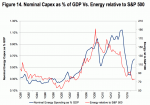Andrew Burton/Getty
- The energy sector's underperformance even with a weaker dollar is "surprising," Citi's Tobias Levkovich says.
- Strategists at Morgan Stanley echoed this point, arguing energy stocks sold off too much after the recent correction.
- Energy stocks are down 4.5% this year, lagging the S&P 500's 3.7% gain.
The energy sector is one of the worst performers in the stock market this year.
Strategists at Morgan Stanley and Citi find this puzzling, and recommend investors change their tone.
Part of what's puzzling is a breakdown of the longstanding relationship between oil-related stocks and the US dollar, the strategists said. Because oil prices are denominated in dollars, a weaker USD makes it easier for holders of other currencies to buy oil, and that demand improves the outlook for oil companies. In fact, a weaker dollar and supply controls are among the main reasons why oil prices jumped 12% last year.
"The underperformance of the energy sector is a bit surprising given dollar weakness," Tobias Levkovich, the chief US equity strategist at Citi, said in a note on Friday.
"In the past, a drop in the greenback meant that oil-related stock prices outpaced the S&P 500 and that pattern has not been in place of late."
Citi has an overweight rating on the energy sector. Strategists at Morgan Stanley, led by Elizabeth Volynsky, also find the sector attractive. In a note on Monday, they said energy stocks "sold off too much" after the recent correction.
Their US stock picks include Continental Resources and Diamondback Energy.
"Energy equities have a positive and statistically significant beta [or price sensitivity] to both oil and the S&P 500, and we see upside for both," Volynsky said.
It's not only the dollar-oil relationship that's broken down, Levkovich said. For nearly three decades, energy capital investment as a share of gross domestic product has been aligned with the stocks' performance — but not anymore.
"It seems implausible that such a differential can persist, generating another reason to take advantage of recent underperformance to add to positions," Levkovich said.
Even after accounting for investors' new, big concern — rising interest rates — energy stocks should theoretically be spared. Levkovich noted oil and gas companies are not as sensitive to changes in the 10-year yield. In fact, crude oil should benefit from this stronger part of the economic cycle that's stoking concerns about inflation and higher interest rates.
What makes energy's underperformance even more puzzling is that Citi clients said they favored energy stocks in a mid-December survey, but the market still shows otherwise.
"We suspect investors may need to be convinced via even higher oil prices to step up," Levkovich said. West Texas Intermediate crude oil, the US benchmark, has gained 6% this year.
Energy stocks are down 4.5% this year, lagging the S&P 500's 3.7% gain.
NOW WATCH: Elon Musk explains the one thing that went wrong with SpaceX's Falcon Heavy flight
See Also:
- Hedge funds did something highly unusual during the market's recent meltdown — and it's a great sign for stocks
- The implosion of a wildly popular trade was actually a good thing, Morgan Stanley's US equity chief says
- MORGAN STANLEY: The stock market's meltdown was just an 'appetizer' — here's how to protect against the next sell-off
SEE ALSO: Wall Street has a new favorite trading idea for a 'fundamental shift' that's happened



